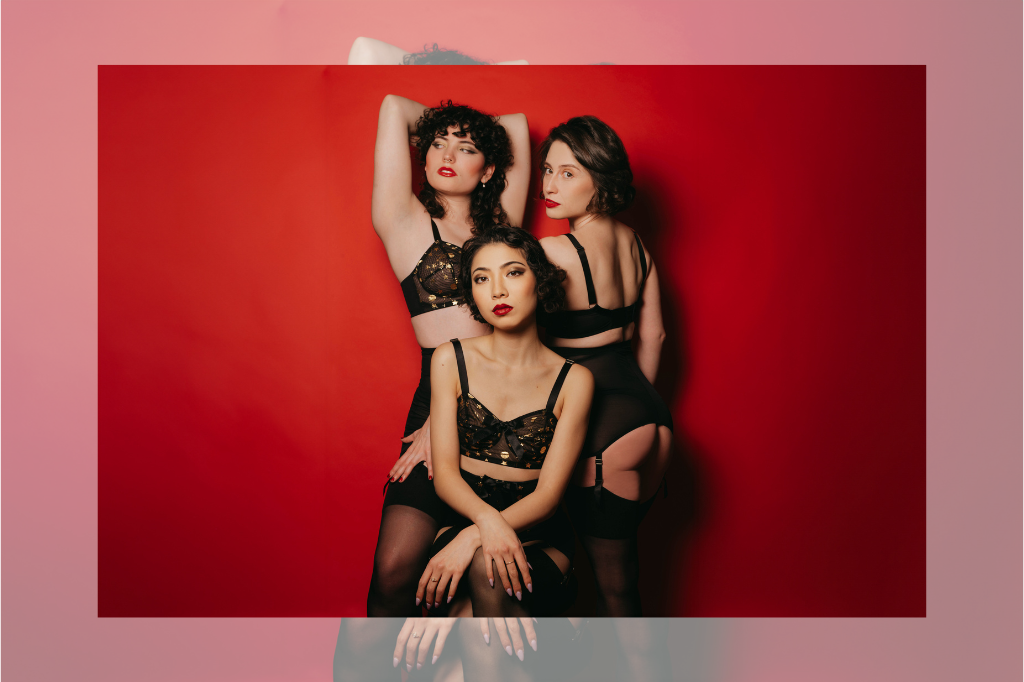REVIEW: Tease uses burlesque to unpack body positivity
It looks like Natasha, Pierre and the Great Comet of 1812 has been dethroned as Crow’s Theatre’s sexiest recent show.
In its place comes Tease, produced by Big City Kitties in association with Crow’s, now playing in the latter’s studio theatre. Tease evades the limitations imposed by genre by easily hopping between styles – is it a burlesque show? Sketch comedy? Dance? Solo monologue? In truth, it’s all of the above, and for the most part, performers Lindsay Mullan, Mei Miyazawa, and Glenys Marshall land Tease with sexy finesse.
The 90-minute romp through third-wave feminism (and an impressive collection of pasties) opens with a raucous game of Never Have I Ever, in which Mullan, Miyazawa, and Marshall attempt to find the most innocent person in the audience – that person, we’re told, will soon be “corrupted” by the sketches featured in Tease. Those vignettes span a wide gamut of subject matter and trope: there’s a goofy, Western-inspired dance, in which the warring cowboys eventually lay down their guns to hook up with one another, and a cute-yet-haunting tap number performed beautifully by Miyazawa. Marshall performs a (very good!) song on guitar about murdering the billionaires of the world. The trio performs clad in Janelle Joy Hince’s lovely costumes in all their spangly, feathery glory.
Tease comes to a head, however, when Mullan appears onstage alone, completely naked. Gone are the tassels and feathers of Tease‘s previous sketches, along with the jangly music and silly scenarios. No, this is Mullan playing Mullan, reflecting on the personal significance of appearing naked on a stage, in a body Mullan says she’s not always treated with respect. Her ruminations on body positivity as an individual are touching and heartfelt (more on this later), along with the jokes she cracks using her body as a prop – one particular gag about Tease‘s neighbour in the Guloien Theatre received big laughs on opening night.
Tease is a lot of fun – this blazing trio of women is funny, sharp, and well-choreographed (all three are cited as the work’s choreographers, along with Gabriel Gonçalves and Dana Thody). But towards the end of Tease, Mullan herself (also the show’s credited director) says the casting “could have been more punk-rock,” and it’s hard not to agree – there’s nothing particularly revolutionary about able-bodied, athletic women dancing seductively in the name of self-love. The bones of Tease are strong, and there’s a more inclusive version of the show that could come to light with further workshopping. In its current iteration, though, I found it difficult to engage with a performance about societal body positivity when none of the bodies onstage looked remotely like mine.
I want to love Tease – it’s an unfussy good time with lots going on in its choreography and trimmings. (And Marshall’s Bo Burnham-esque song about billionaires has been stuck in my head since Thursday!). But I’m curious about how the show might continue to grow and evolve. The conversation Tease starts is metal as hell – it’ll be all the more so when more body types are able to participate.
Tease runs at Crow’s Theatre until March 24. Tickets are available here.
Intermission reviews are independent and unrelated to Intermission‘s partnered content. Learn more about Intermission‘s partnership model here.














Comments